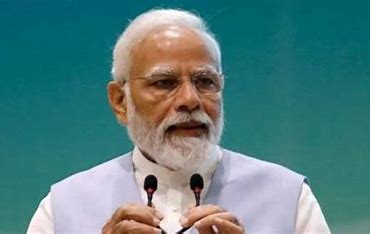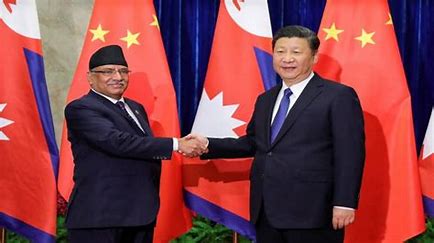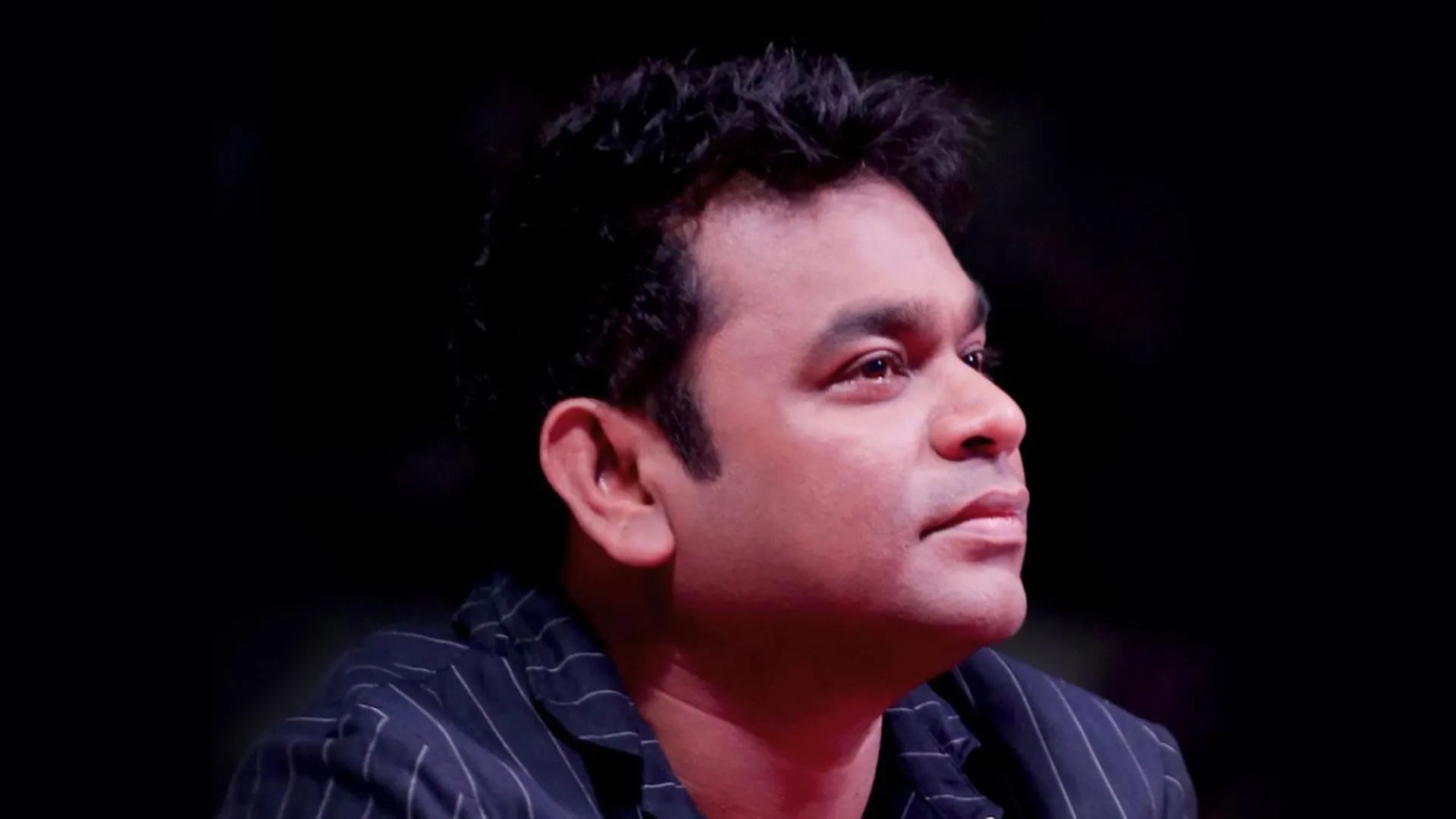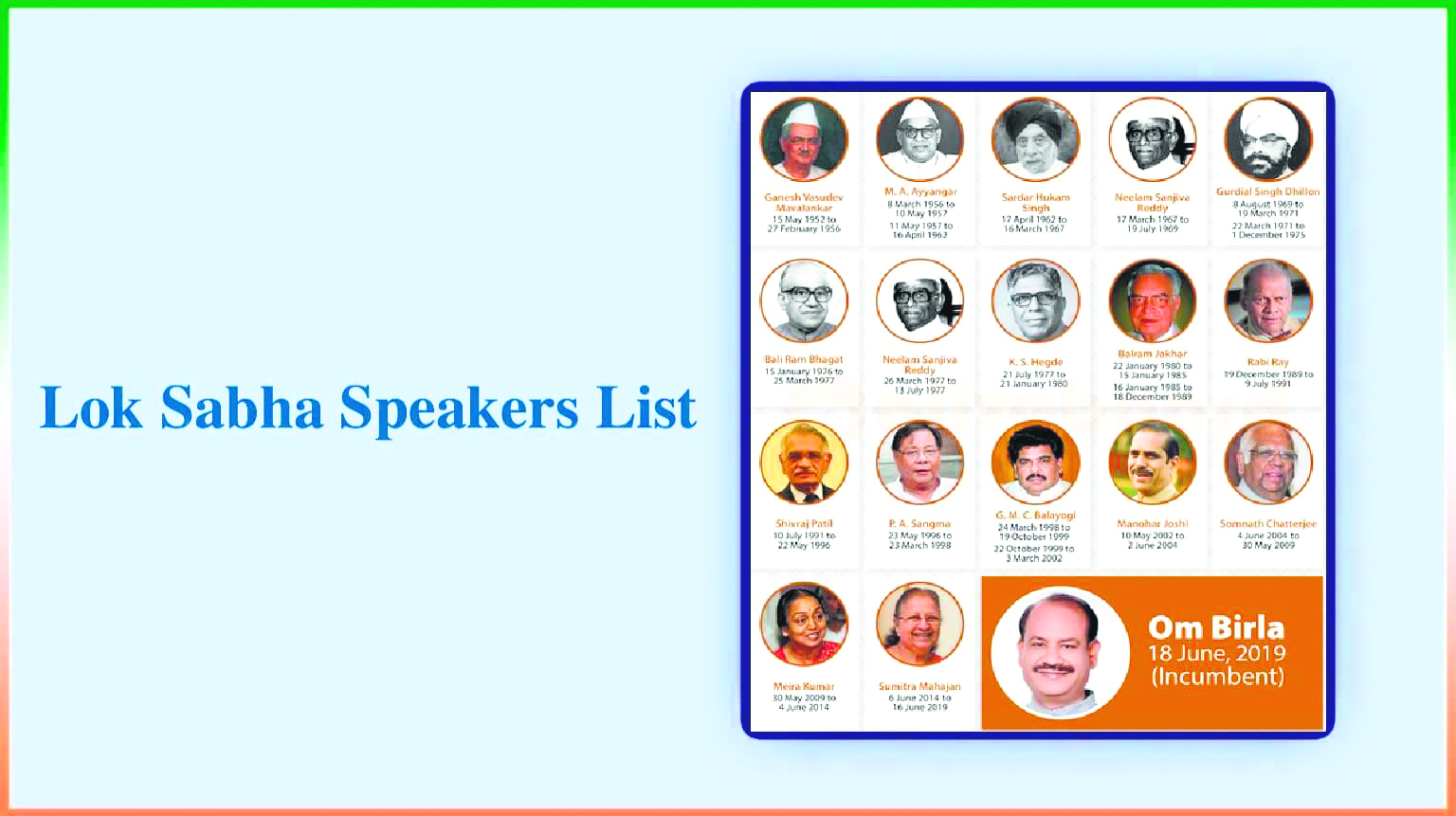
As custodians of parliamentary decorum and guardians of democratic principles, the legacy of Lok Sabha Speakers resonates through the chronicles of Indian democracy, serving as a testament to the enduring strength and resilience of the nation’s democratic institutions.
As custodians of parliamentary decorum and guardians of democratic principles, the legacy of Lok Sabha Speakers resonates through the chronicles of Indian democracy, serving as a testament to the enduring strength and resilience of the nation’s democratic institutions.
The Speakers of the Lok Sabha in India hold a position of paramount importance within the nation’s parliamentary framework. Charged with overseeing the proceedings of the lower house of Parliament, they wield significant authority and responsibility in ensuring the smooth functioning of the legislative process. Throughout the rich tapestry of India’s democratic history, these individuals have served as custodians of parliamentary decorum, bastions of democratic values, and architects of consensus-building in the tumultuous arena of Indian politics.
The speaker of the Lok Sabha is the presiding officer and the highest authority of the Lok Sabha, the lower house of the Parliament of India. The speaker is elected generally in the first meeting of the Lok Sabha following general elections. Serving for a term of five years, the speaker is chosen from sitting members of the Lok Sabha.
The independent India has witnessed 17 Lok Sabha Speakers, including second innings of two speakers, till date. As Lok Sabha election are round the corner and the house is possibly going to have a new speaker, today, we are going to provide you the insights about the history of the Lower House’s speakers since independence:
The First Speaker
Ganesh Vasudev Mavalankar (1952-1956): The journey of the Speakership in the Lok Sabha commenced with Ganesh Vasudev Mavalankar, who assumed office in 1952. Mavalankar, an illustrious leader of the Indian National Congress, set the stage for subsequent speakers by establishing the norms of impartiality, fairness, and dignity in the conduct of parliamentary affairs. Born on November 27, 1888, in Baroda (now Vadodara) in present-day Gujarat, Mavalankar hailed from a family deeply entrenched in the Indian nationalist movement. Inspired by the ideals of Mahatma Gandhi and the Indian National Congress, he emerged as a prominent political leader during the struggle for independence. Mavalankar’s journey into the realm of parliamentary politics began with his election to the Central Legislative Assembly in 1934, where he distinguished himself as a formidable advocate for social justice and democratic reforms.

However, it was in the aftermath of India’s independence in 1947 that Mavalankar’s leadership truly came to the fore. With the establishment of the Constituent Assembly tasked with drafting the Constitution of India, he was entrusted with the crucial responsibility of chairing the Assembly’s Steering Committee. His astute guidance and diplomatic acumen played a pivotal role in navigating the complex negotiations and consensus-building processes that shaped the foundational document of independent India.
In 1952, with the dawn of India’s parliamentary democracy, Mavalankar assumed the historic role of the Speaker of the Lok Sabha, the lower house of Parliament. As the custodian of parliamentary proceedings, he set the tone for the institution’s functioning, upholding the principles of impartiality, fairness, and democratic governance. Mavalankar’s tenure as Speaker was characterized by his firm adherence to parliamentary norms, his unwavering commitment to the rule of law, and his steadfast defense of the rights and privileges of members of Parliament.
Since then, a succession of eminent leaders has held the mantle of the Speakership, each leaving an indelible mark on the annals of Indian parliamentary history.
M. A. Ayyangar (1956-1957): Madabusi Ananthasayanam Ayyangar, a distinguished lawyer and politician, served as Speaker of the Lok Sabha for a brief period. He was known for his erudition and astute understanding of parliamentary procedures.
Hukam Singh (1957-1962): Hukam Singh, a seasoned politician from Punjab, served as Speaker during a crucial phase of India’s parliamentary evolution. He was respected for his firmness, fairness, and commitment to upholding the dignity of the Speakership.
Neelam Sanjiva Reddy (1962-1967): Neelam Sanjiva Reddy, a towering figure in Indian politics, served as Speaker before later becoming the President of India. He was known for his statesmanship, integrity, and ability to foster consensus among members of Parliament.
Sardar Hukam Singh (1967-1969): Sardar Hukam Singh returned to the Speakership for a second term, bringing his experience and leadership to bear during a period of political turbulence and transition.
Gurdial Singh Dhillon (1969-1971): Gurdial Singh Dhillon, a prominent leader from Punjab, presided over the Lok Sabha during a challenging period marked by internal strife and external threats. He was known for his calm demeanor and dedication to parliamentary norms.
Bali Ram Bhagat (1976-1977): Bali Ram Bhagat, a seasoned politician from the Indian National Congress, held the Speakership during a brief period of parliamentary revival following the Emergency. He was known for his commitment to upholding democratic values and parliamentary traditions.
Neelam Sanjiva Reddy (1977-1979): Returning to the position of Speaker after serving as President, Neelam Sanjiva Reddy continued to uphold the dignity and integrity of the Speakership, earning admiration from all quarters.
K. S. Hegde (1979-1980): Kariya Siddappa Hegde, a veteran parliamentarian from Karnataka, served as Speaker during a critical juncture in Indian politics. He was known for his impartiality, integrity, and commitment to upholding parliamentary democracy.
Balram Jakhar (1980-1989): Balram Jakhar, one of the longest-serving Speakers of the Lok Sabha, was a towering figure in Indian politics. Hailing from Rajasthan, he was known for his advocacy of agricultural issues and his dedication to the welfare of farmers.
Rabi Ray (1989-1991): Ray’s political career gained momentum when he joined the Socialist Party and later became associated with the Janata Party. He was elected to the Lok Sabha multiple times, representing the Puri constituency in Odisha. Ray’s tenure as Speaker of the Lok Sabha marked a significant chapter in India’s parliamentary history.
Shivraj Patil (1991-1996): Born on October 12, 1935, in Akola, Maharashtra, Patil was a member of the Indian National Congress. As Speaker, Patil presided over the Lok Sabha during a period of significant legislative activity and political transition, demonstrating firmness, impartiality, and a deep understanding of parliamentary procedures. His tenure as Speaker was marked by his commitment to upholding the dignity and integrity of the institution, ensuring constructive debates, and fostering consensus among members of Parliament.
P. A. Sangma (1996-1998): Purno Agitok Sangma, popularly known as P. A. Sangma, served as the Speaker of the Lok Sabha from 1996 to 1998. Born on September 1, 1947, in the state of Meghalaya, Sangma was a prominent political leader known for his advocacy of tribal rights and regional development. He was a founding member of the Nationalist Congress Party (NCP) and held various ministerial positions in the central government. As Speaker, Sangma brought a unique perspective to the role, being the first tribal leader to hold the position. His tenure was marked by his efforts to uphold parliamentary norms, ensure the smooth functioning of legislative proceedings, and represent the diverse interests of the Indian populace.
G. M. C. Balayogi (1998-2002): Ganti Mohana Chandra Balayogi, often referred to as G. M. C. Balayogi, served as the Speaker of the Lok Sabha from 1998 to 2002. Born on January 1, 1951, in Andhra Pradesh, Balayogi was a member of the Telugu Desam Party (TDP) and a prominent leader from the southern state. Prior to his tenure as Speaker, he held various positions in the TDP and served as a Member of Parliament.
Manohar Joshi (2002-2004): Born on December 2, 1937, in Ratnagiri, Joshi is a member of the Shiv Sena party. He began his political career in the 1960s and held various ministerial positions in the Maharashtra state government before being elected to the Lok Sabha. As Speaker, Joshi brought his experience and leadership skills to the role, ensuring the smooth functioning of parliamentary proceedings and upholding the dignity of the institution.
Somnath Chatterjee (2004-2009): Born on July 25, 1929, in Assam, Chatterjee was associated with the Communist Party of India (Marxist) (CPI(M)). Chatterjee’s tenure as Speaker was marked by his deep knowledge of parliamentary procedures, his impartiality, and his firm adherence to democratic principles. He played a crucial role in maintaining the dignity and integrity of the Lok Sabha, ensuring constructive debates, and fostering consensus among members of Parliament.
Meira Kumar (2009-2014): She made history as the first woman to hold this prestigious position in India. Born on March 31, 1945, in Bihar, Meira Kumar came from a distinguished political family; her father, Jagjivan Ram, was a prominent leader in the Indian National Congress. Before assuming the Speakership, Kumar had a distinguished career as a diplomat and a Member of Parliament. Her historic tenure as Speaker paved the way for greater gender diversity and representation in Indian politics.
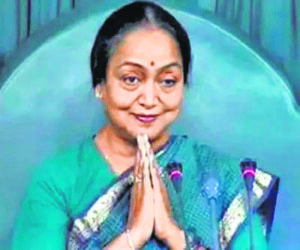
Sumitra Mahajan (2014-2019): Born on April 12, 1943, in Maharashtra, Mahajan was a prominent leader of the Bharatiya Janata Party (BJP) and a seasoned parliamentarian. She began her political career in the 1980s and held various ministerial positions before assuming the Speakership. Known for her simplicity, humility, and firmness, Mahajan brought a sense of dignity and decorum to the Lok Sabha proceedings. She earned a nickname of “Tai” (elder sister) among her colleagues and admirers.
Om Birla (2019-present): He is the incumbent Speaker of the Lok Sabha since 2019 and a prominent political figure from Rajasthan, India. Born on November 23, 1962, in Kota, Birla is a member of the Bharatiya Janata Party (BJP) and has been actively involved in politics from a young age. Before assuming the Speakership, Birla served as a Member of Parliament from the Kota-Bundi constituency in Rajasthan. Known for his grassroots connect, organizational skills, and dedication to public service, Birla has earned the trust and respect of his constituents and colleagues alike.
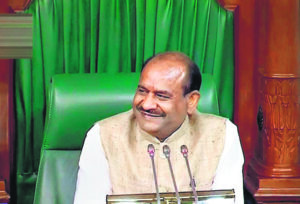
Powers and Functions
The Speaker of the Lok Sabha conducts the business in house, and decides whether a bill is a money bill or not. They maintain discipline and decorum in the house and can punish a member for unruly behaviour with respect to law after suspending them. They also permit the moving of various kinds of motions and resolutions such as a motion of no confidence, motion of adjournment, motion of censure and calling attention notice as per the rules. The Speaker decides on the agenda to be taken up for discussion during the meeting. The date of election of the Speaker is fixed by the President. Further, all comments and speeches made by members of the House are addressed to the Speaker. The Speaker also presides over the joint sitting of both houses of the Parliament of India. The counterpart of the Speaker in the Rajya Sabha (Council of the States) is its Chairperson; the Vice-President of India is the ex-officio chairperson of the Rajya Sabha. On the order of precedence, the Speaker of Lok Sabha ranks sixth, along with the Chief Justice of India. The Speaker is answerable to the House. Both the Speaker and Deputy Speaker may be removed by a resolution passed by the majority of the members. Lok Sabha Speaker can be elected by President on a nomination basis.
All bills passed requires the speaker’s signature to go to the Rajya Sabha for its consideration. The Speaker also has a casting vote in the event of a tie. It is customary for the Presiding Officer to exercise the casting vote in such a manner as to maintain the status quo.

